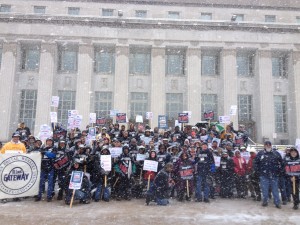
By CATHY SHERWIN
Special Correspondent
Neither snow, nor rain, nor cold winds kept hundreds of postal employees, community members, faith leaders, and retirees from their mission as Missourians braved tough weather conditions to join “Delivering for America” rallies here and in Kansas City, Springfield and Cape Girardeau. The crowds gathered in these Missouri cities were among thousands participating in hundreds of rallies nationwide to Save the United States Postal Service.
Protesters called for Congress to take action against the plan to end Saturday delivery that would result in deep service cuts to citizens and businesses in every community across the country.
“Our leaders in Washington D.C. have a responsibility to support good jobs and get our economy on track. The planned cuts to the U.S. Postal Service will set us back from both those important priorities,” said Rev. Martin Rafanan, Missouri Jobs with Justice, at the St. Louis rally, echoing the concerns that these cuts would have on local communities.
“We cannot afford to be silent and watch as a plan unfolds that would cost middle class jobs in our community and reduce access to critical services,” he added.
An owner of a direct mail marketing company said the Postal Service “Is absolutely crucial for businesses like mine.”
NOT BROKE
“Everyone needs to know that the Postal Service isn’t broke. Instead, it is facing a manufactured shortfall due to an unfair congressional mandate to pre-pay costs that won’t be due for decades,” said Kevin Boyer, Missouri State president, National Association of Letter Carriers.
“No other institution or business in this country is held to such an unrealistic standard, and this plan would cost all of us. The steep reductions proposed would be devastating to Missouri, and would hit senior citizens, small businesses and rural areas the hardest across the country.”
CONGRESS CREATED THE PROBLEM
While the Postal Service is facing financial uncertainty and must seek to increase its revenue and carefully reduce overhead expenses, the truth is this crisis is not simply the result of increased Internet usage and a tough economy. Despite the worst recession in 80 years, the Postal Service has done well operationally. In fiscal years 2007 through 2010, it had a net operational profit of $611 million delivering the mail.
Starting in 2007, a short-sighted mandate from Congress has required the Postal Service to set aside – in just 10 years – enough money to pay almost all retiree health benefits for the next 75 years – something no other public agency or private company is required to do. This has cost the Postal Service $32 billion since 2007, accounting for 78 percent of its red ink during this period.
WE NEED MAIL SERVICE
Americans depend on a strong Postal Service. It is our country’s only universal communication network, binding all four corners of the United States together.
The Postal Service delivers 160 billion pieces of mail each year to more than 152 million homes, businesses and Post Office boxes throughout the country.
Much of the population still sends and receives its monthly bills through the mail; vulnerable groups need ready access to the postal network to receive life-saving goods, like prescription medicines; e-commerce is supported by the USPS’s universal delivery service; businesses remain dependent on a low cost, reliable service for their invoicing and shipping – six days a week; and the Postal Service is at the center of a trillion dollar printing, publishing and mailing industry that employs more than seven million private-sector workers.

